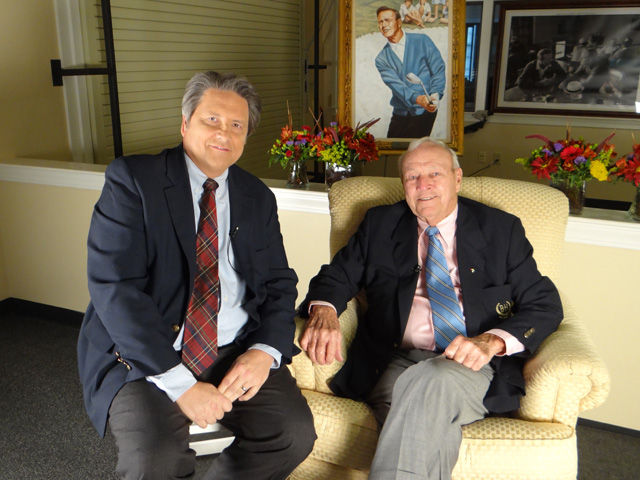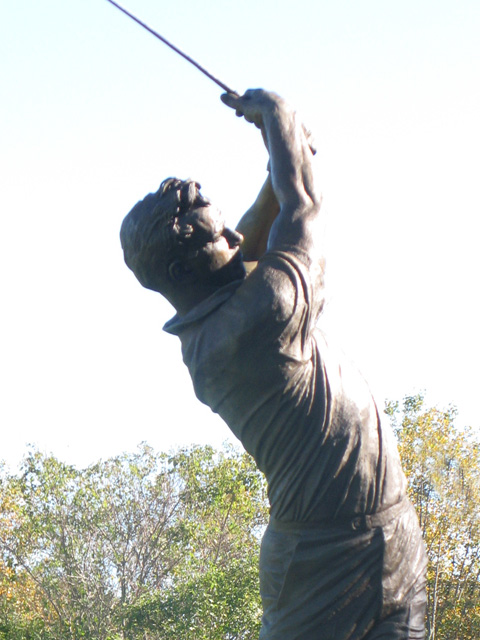
I always thought my parents would live forever. That’s just how children think. But even as an adult, I still felt like a kid whenever I was around Mom and Dad. Sometimes those feelings can also extend to people outside of our immediate family. People who are so familiar to us, and so much a part of our life, that we can’t imagine a time when they wouldn’t be around. That’s how I felt about Arnold Palmer. Sadly, his time came on September 25. He was 87.
Arnold Palmer was a mythic figure who could do almost anything. He transformed and transcended the game of golf, and moved his sport into the television age. He took heroic risks on the course that sometimes led to disaster, but they also led to 92 tour victories, including seven majors. He flew his own jet. He invented products, designed golf courses, and created a business empire. He hadn’t won a PGA tour event since 1973, yet remained one of the world’s top money-making athletes until the day he died.

Three years ago this month, Mr. Palmer visited his beloved Wake Forest University for the unveiling of a commemorative statue. The impressive sculpture stands nine feet in height (sixteen feet if you measure from the tip of the club head), and it captures the powerful golf swing he made famous at the 1964 Masters. Immediately following the ceremony, I was granted the only private interview with Arnie. I had interviewed hundreds of big name celebrities over the past 40 years, but this was different. As a child I had been a vicarious member of Arnie’s Army every weekend, and now I found myself sitting next to the man. As the crew checked camera and microphone levels, I confessed to Arnold that I was nervous about meeting him. He reached over and put his right hand on my forearm and smiled as if to say, “Relax son, I’m nobody special”. But he WAS special. That’s why his alma mater erected a statue in his honor. And it’s why Senior Services asked him to deliver the five millionth Meals on Wheels lunch earlier that same day. It was not a publicity stunt, it was just another example of how Palmer had dedicated his life to helping others, including serving as national March of Dimes chairman, awarding college scholarships, and founding a women’s and children’s hospital. But Arnold Palmer never bragged about his public service, nor about his wealth, or his athletic abilities. It was a character trait he learned from his father Deacon Palmer, who taught Arnie to be humble. That humility was evident when he answered my first question.
JL: Everyone knows the story of how your father, Deacon Palmer put a golf club in your hand at age three, but at what age were you cocky enough to realize you were a great golfer?
AP: That’s a good question because my father was tough, and he kept me from becoming a cocky kid. His mannerisms, his teaching held me down, and at the time I thought, “Well, boy, he’s too tough on me”. But later on I realized that the things he was doing are the things that let me do what I did. He never got overwhelmed with what I was doing, or how I was playing, and he rarely ever told me how good I was. He would say, ‘Just show me, and that’s good enough for me’.
JL: I understand, but when did you THINK you were really good?
AP: (it was when) I came to Wake Forest and I was able to compete with the people I was playing against.
That’s an understatement. While attending Wake Forest College (then located in Wake County), Palmer captured both the Southern Conference crown and NCAA individual title in 1949 and 1950, led the Demon Deacon golf team to three Southern Conference championships, and won the inaugural 1954 ACC championship. Back then, there was no Arnie’s Army. That came after he turned pro. As Palmer’s fame grew, so did the crowds, thousands of whom followed him from hole to hole, cheering him on, and sometimes taunting his opponents. I wondered what impact those fans might have had on his game, and that of his competitors.
JL: Today we hear about the crowds at big football stadiums being the 12th man on the field, and affecting the outcome of a game. Did “Arnie’s Army” help you play better? And, conversely, do you feel it might have intimidated the men you played against?
AP: Well I think both are true. And I think it encouraged me because I felt a responsibility to the people, as I did to my father, to perform at the top of my profession.
JL:Did your competitors feel so intimidated that they missed a putt here and there?
AP: (smiling) Well I can only speculate on that and say, ‘I hope they felt intimidated’.
I know how they felt, because I was also intimidated by Arnie, but not for long. I will particularly remember his genuine warmth, and how he acted the same on camera as he did off, treating everyone in our crew like we were really special. It’s what made HIM so special. Still, the irony of the occasion didn’t escape me. We were there to commemorate an easily measurable statue of a man who never knew just how tall he stood in our eyes.
The Passing of Arnold Palmer
I always thought my parents would live forever. That’s just how children think. But even as an adult, I still felt like a kid whenever I was around Mom and Dad. Sometimes those feelings can also extend to people outside of our immediate family. People who are so familiar to us, and so much a part of our life, that we can’t imagine a time when they wouldn’t be around. That’s how I felt about Arnold Palmer. Sadly, his time came on September 25. He was 87.
Arnold Palmer was a mythic figure who could do almost anything. He transformed and transcended the game of golf, and moved his sport into the television age. He took heroic risks on the course that sometimes led to disaster, but they also led to 92 tour victories, including seven majors. He flew his own jet. He invented products, designed golf courses, and created a business empire. He hadn’t won a PGA tour event since 1973, yet remained one of the world’s top money-making athletes until the day he died.
Three years ago this month, Mr. Palmer visited his beloved Wake Forest University for the unveiling of a commemorative statue. The impressive sculpture stands nine feet in height (sixteen feet if you measure from the tip of the club head), and it captures the powerful golf swing he made famous at the 1964 Masters. Immediately following the ceremony, I was granted the only private interview with Arnie. I had interviewed hundreds of big name celebrities over the past 40 years, but this was different. As a child I had been a vicarious member of Arnie’s Army every weekend, and now I found myself sitting next to the man. As the crew checked camera and microphone levels, I confessed to Arnold that I was nervous about meeting him. He reached over and put his right hand on my forearm and smiled as if to say, “Relax son, I’m nobody special”. But he WAS special. That’s why his alma mater erected a statue in his honor. And it’s why Senior Services asked him to deliver the five millionth Meals on Wheels lunch earlier that same day. It was not a publicity stunt, it was just another example of how Palmer had dedicated his life to helping others, including serving as national March of Dimes chairman, awarding college scholarships, and founding a women’s and children’s hospital. But Arnold Palmer never bragged about his public service, nor about his wealth, or his athletic abilities. It was a character trait he learned from his father Deacon Palmer, who taught Arnie to be humble. That humility was evident when he answered my first question.
JL: Everyone knows the story of how your father, Deacon Palmer put a golf club in your hand at age three, but at what age were you cocky enough to realize you were a great golfer?
AP: That’s a good question because my father was tough, and he kept me from becoming a cocky kid. His mannerisms, his teaching held me down, and at the time I thought, “Well, boy, he’s too tough on me”. But later on I realized that the things he was doing are the things that let me do what I did. He never got overwhelmed with what I was doing, or how I was playing, and he rarely ever told me how good I was. He would say, ‘Just show me, and that’s good enough for me’.
JL: I understand, but when did you THINK you were really good?
AP: (it was when) I came to Wake Forest and I was able to compete with the people I was playing against.
That’s an understatement. While attending Wake Forest College (then located in Wake County), Palmer captured both the Southern Conference crown and NCAA individual title in 1949 and 1950, led the Demon Deacon golf team to three Southern Conference championships, and won the inaugural 1954 ACC championship. Back then, there was no Arnie’s Army. That came after he turned pro. As Palmer’s fame grew, so did the crowds, thousands of whom followed him from hole to hole, cheering him on, and sometimes taunting his opponents. I wondered what impact those fans might have had on his game, and that of his competitors.
JL: Today we hear about the crowds at big football stadiums being the 12th man on the field, and affecting the outcome of a game. Did “Arnie’s Army” help you play better? And, conversely, do you feel it might have intimidated the men you played against?
AP: Well I think both are true. And I think it encouraged me because I felt a responsibility to the people, as I did to my father, to perform at the top of my profession.
JL:Did your competitors feel so intimidated that they missed a putt here and there?
AP: (smiling) Well I can only speculate on that and say, ‘I hope they felt intimidated’.
I know how they felt, because I was also intimidated by Arnie, but not for long. I will particularly remember his genuine warmth, and how he acted the same on camera as he did off, treating everyone in our crew like we were really special. It’s what made HIM so special. Still, the irony of the occasion didn’t escape me. We were there to commemorate an easily measurable statue of a man who never knew just how tall he stood in our eyes.